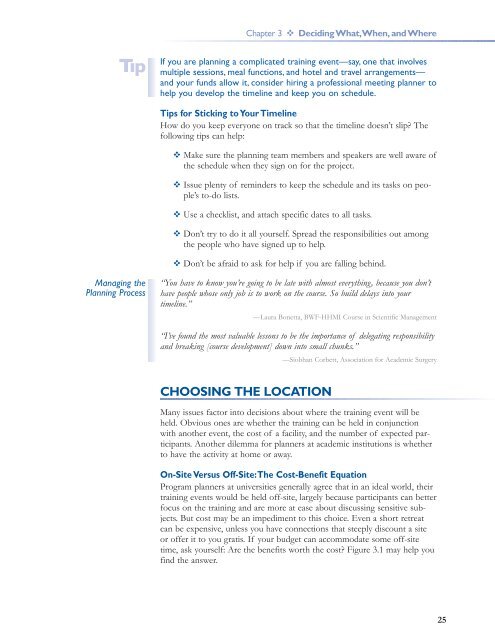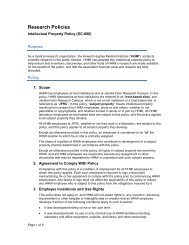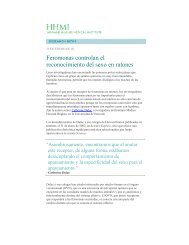Training Scientists to Make the Right Moves - Howard Hughes ...
Training Scientists to Make the Right Moves - Howard Hughes ...
Training Scientists to Make the Right Moves - Howard Hughes ...
You also want an ePaper? Increase the reach of your titles
YUMPU automatically turns print PDFs into web optimized ePapers that Google loves.
At a Glance<br />
Chapter 3 Deciding What,When, and Where<br />
If you are planning a complicated training event—say, one that involves<br />
multiple sessions, meal functions, and hotel and travel arrangements—<br />
and your funds allow it, consider hiring a professional meeting planner <strong>to</strong><br />
help you develop <strong>the</strong> timeline and keep you on schedule.<br />
Tips for Sticking <strong>to</strong> Your Timeline<br />
How do you keep everyone on track so that <strong>the</strong> timeline doesn’t slip? The<br />
following tips can help:<br />
<strong>Make</strong> sure <strong>the</strong> planning team members and speakers are well aware of<br />
<strong>the</strong> schedule when <strong>the</strong>y sign on for <strong>the</strong> project.<br />
Issue plenty of reminders <strong>to</strong> keep <strong>the</strong> schedule and its tasks on people’s<br />
<strong>to</strong>-do lists.<br />
Use a checklist, and attach specific dates <strong>to</strong> all tasks.<br />
Don’t try <strong>to</strong> do it all yourself. Spread <strong>the</strong> responsibilities out among<br />
<strong>the</strong> people who have signed up <strong>to</strong> help.<br />
Don’t be afraid <strong>to</strong> ask for help if you are falling behind.<br />
Managing <strong>the</strong><br />
Planning Process<br />
“You have <strong>to</strong> know you’re going <strong>to</strong> be late with almost everything, because you don’t<br />
have people whose only job is <strong>to</strong> work on <strong>the</strong> course. So build delays in<strong>to</strong> your<br />
timeline.”<br />
—Laura Bonetta, BWF-HHMI Course in Scientific Management<br />
“I’ve found <strong>the</strong> most valuable lessons <strong>to</strong> be <strong>the</strong> importance of delegating responsibility<br />
and breaking [course development] down in<strong>to</strong> small chunks.”<br />
—Siobhan Corbett, Association for Academic Surgery<br />
CHOOSING THE LOCATION<br />
Many issues fac<strong>to</strong>r in<strong>to</strong> decisions about where <strong>the</strong> training event will be<br />
held. Obvious ones are whe<strong>the</strong>r <strong>the</strong> training can be held in conjunction<br />
with ano<strong>the</strong>r event, <strong>the</strong> cost of a facility, and <strong>the</strong> number of expected participants.<br />
Ano<strong>the</strong>r dilemma for planners at academic institutions is whe<strong>the</strong>r<br />
<strong>to</strong> have <strong>the</strong> activity at home or away.<br />
On-Site Versus Off-Site:The Cost-Benefit Equation<br />
Program planners at universities generally agree that in an ideal world, <strong>the</strong>ir<br />
training events would be held off-site, largely because participants can better<br />
focus on <strong>the</strong> training and are more at ease about discussing sensitive subjects.<br />
But cost may be an impediment <strong>to</strong> this choice. Even a short retreat<br />
can be expensive, unless you have connections that steeply discount a site<br />
or offer it <strong>to</strong> you gratis. If your budget can accommodate some off-site<br />
time, ask yourself: Are <strong>the</strong> benefits worth <strong>the</strong> cost? Figure 3.1 may help you<br />
find <strong>the</strong> answer.<br />
25
















